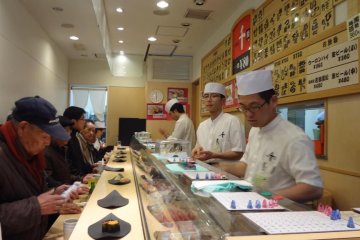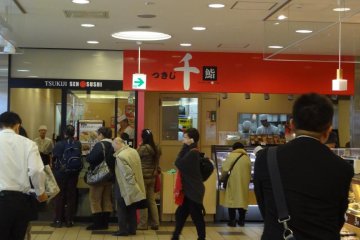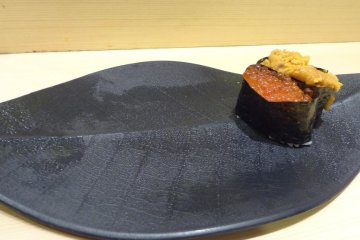Sushi Heaven
If you like sushi, then welcome to sushi heaven. Japanese people LOVE sushi. In fact, they love it so much that there are four ways to buy and eat sushi in Japan.
(1) Buy it “take out”. You can buy expensive or cheap shushi from shops that specialize in sushi, supermarkets or even convenience stores like 7-11 here in Japan.
(2) Eat at a sushi restaurant. These restaurants will range from expensive to fairly inexpensive. It’s really enjoyable to sit at the counter where you can either point at what you want, or shout our your order to the sushi chef.
(3) Eat at a “Conveyor Belt” sushi restaurant. These are great and have become popular in big cities overseas. Sit down at a counter and as the sushi comes sliding by you on a conveyor belt, grab whatever looks good.
(4) Eat at a “Standing” sushi restaurant. This is what I will write about now. So here goes…!
What is a “standing sushi shop”?
You may have tried “conveyer belt” sushi, in your country or in Japan. But I’m pretty sure you have never experienced eating at a “standing” sushi shop. The difference between conveyer belt sushi and standing sushi is quality, taste and speed. Standing sushi shop chefs have good technique, the fish is fairly fresh and of high quality, and customers can enjoy verbal exchanges with the sushi chef when they order, just like at a regular sushi shop. But different from regular sushi shops, there are no seats, and so…customers don’t stay long.
Where is it?
Inside Ofuna Station, just above the platforms, there is a shopping area “Dila Ofuna” close to the south exit. Tsukiji Sen Sushi (つきじ千鮨) is located inside Dila Ofuna. This means you can stop and eat some sushi while changing trains. How convenient is that?! At lunchtime and dinnertime, there is always a long line in front of the shop. But even if five people are waiting in front of you, you will be able to enter the shop and start eating within five minutes or so. So don’t hesitate to wait in line.
How to order
When you get a place at the counter, please make eye contact with the sushi chef closest to you. The timing is really important. If you know what you want, just tell him the names of a few neta (fish names) at the same time. If you order your sushi one by one, you’ll have to wait a few minutes each time you order. If you have no idea what to choose, “Omakase (oh-mah-kah-say) sushi” is easy. It is a sushi set that includes 10 pieces of seasonal sushi for only 690 yen.
Preparing to eat
There are small, round plates on the lower counter in front of you. Please take a plate and pour a bit of soy sauce into it. You can also take some slices of sweet-and-sour ginger from the black container on the counter and put them onto your plate with the soy sauce. While you are waiting for your sushi to come, or whenever you want to refresh your mouth between one piece of sushi and the next, these are quite refreshing. While eating, you can choose to use either chopsticks or your fingers; both are perfectly good manners at a sushi shop. The sushi itself will be served on black plates that resemble the shape of a leaf. Elegant!
How to leave
When you finish, please say thank you to the chef, or make eye contact with him again. And then go to the cashier. The chef will tell a clerk or cashier what you ate, and she will calculate your bill. The time required in total, from the moment you come into the shop until the time you leave should be about 10 to 15 minutes.
Compared with conveyer belt sushi, standing sushi is easy, tasty, enjoyable, speedy, and—because you are standing and won’t be staying too long—relatively inexpensive!
Ofuna Station is on the Tokaido Line, Yokosuka Line, and Keihin-Tohoku Line. So, on the way back from Kamakura to Yokohama or Tokyo, why don’t you give this new style standing sushi a try?!
*This is Part 1 of a two-part series on standing food shops. Part 2 introduces a great standing soba shop in Sakauragicho Station!












